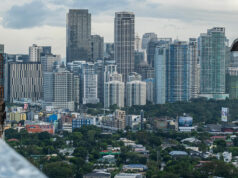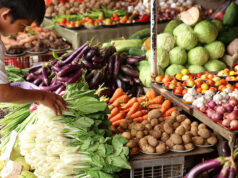The New York Times reported on March 28 that New York State, by 2020, will join California and Hawaii as among the US states to ban most types of single-use plastic bags from retail sales. By March next year, under a new law, stores in New York state will no longer provide customers with single-use plastic bags that are nonbiodegradable.
There will be exceptions, of course, such as “food takeout bags used by restaurants, bags used to wrap deli or meat counter products, and bags for bulk items. Newspaper bags would also be exempted, as would garment bags and bags sold in bulk, such as trash or recycling bags,” reported the Times.
An option for shoppers is to pay a 5-cent fee on paper bags, which will go to the New York Environmental Protection Fund as well as a separate fund to buy reusable bags for consumers. By banning plastic bags and charging for paper bags, New York hopes its consumers will turn instead to reusable bags.
But the Times also reported that some retailers are against the plan, noting that part of the fee for paper bags should also go to them. The Food Industry Alliance of New York State, for one, claims that the ban will “have a drastic impact on retailers,” and that “the failure to give even a portion of the 5-cent fee back to the stores, makes this an untenable mandate for many… who operate within finite profit margins.”
A ban on plastic bags has been in place for some time in many big cities here. But it has not significantly curbed plastic use. In some supermarkets, for instance, fresh, damp, or wet items such as fresh meat, fruits, vegetables, and other produce are still placed in single-use plastic bags — biodegradable, of course — before they are placed in either boxes, paper grocery bags, or reusable bags.
Take the case of a one-kilogram pack of sausages that has about 18 pieces. Each sausage is vacuum-wrapped in plastic, and then all these wrapped sausages are sold in plastic packaging. At the checkout counter, the double-wrapped sausage pack is then placed in another plastic bag so that its dampness will not soil the paper bag. All these “wrapping” are single-use plastic “bags.”
The same goes for fresh meat sold in a “plastic bag,” and which is double-wrapped with plastic to avoid leakage, before being placed in a box or reusable bag. Even dry goods are not spared from “wrapping.” Many items that are sold in boxes like biscuits are bagged in plastic inside the box to keep their freshness, while the outer packaging is again wrapped in plastic also for pest control.
Single-use plastic bags as carrying bags are just the tip of the iceberg. Plastic packaging is more the culprit, in my opinion, and the burden is not on retailers but on manufacturers. People have reusable bags for carrying, but if all the items in it were wrapped in plastic still, then the plastic will persist. People tend to use more plastic wrapping now than when they could simply dump produce and other wet items in a plastic bag for carrying.
It is in this line that I laud the effort of one global manufacturer of personal care products that temporarily put up several “refilling” stations for hair care products in different parts of Metro Manila. Consumers can bring “used” product containers to the stations and “refill” them. The stations are temporary, as I am sure this is just a way for the manufacturer to “test” the market.
But I am already imagining the future of having such stations in supermarkets, where people can bring reusable containers for refilling. And this can be done not only for personal care products but even for food products like coffee, sugar, salt, grains and dried legumes, and others. Even pasta and other types of dried noodles can be sold in “bulk” rather than in plastic packs.

It is in this regard, the effort to curb the retail of items in single-use plastic bags, that I cannot understand why the government stopped the sale of rice in bulk bins and mandated rice retailers to sell grains in sealed plastic bags of various weights. Bins could have just been covered, for sanitation or hygiene purposes, rather than bagging rice in plastic retail packs.
People used to bring wicker baskets or big native bags called “bayong” to the public market, and simply dump all the fresh produce in them. No packaging or wrapping required. Liquid items such as sauces and cooking oil were sold in glass bottles. Rice and grains were sold in thick brown paper bags. Dried fish as well as meat products can be wrapped in old newspapers. But fruits and vegetables were usually unwrapped.
Beer and soda and other beverages were all sold in glass bottles, which could be reused or recycled after so many uses. Even school items were recyclable like paper notebooks and wooden pencils. People also used “refillable” fountain pens, not disposable pens, so one could keep a good pen practically for life.
Even hardware stores would sell nails and screws wrapped in old newspapers, rather than plastic packaging. Small amounts of cement and sand were also sold in thick paper bags, while bigger volumes were sold in paper or jute sacks or were delivered in bulk, unwrapped. Paints were sold in cans, and small amounts of solvents were retailed in glass bottles with tin caps. Plastic was not a problem back then, either for us or for the rest of the world.
But today, “millions of tons of plastic enter the ocean each year, a significant volume of which comes from the Philippines,” the World Bank said. Thus, along with the Royal Norwegian Embassy in Manila, it is co-hosting a conference on Marine Plastic Pollution in the Philippines, to “bring together key stakeholders in the Philippines from government, development partners, and civil society, in order to enhance knowledge and information sharing on marine plastic pollution in the Philippines.”
This is in light of the fact that there are “no official statistics” as to “the magnitude of plastic waste thrown on land and ending up in rivers, lakes, and the oceans, it said. “What is known is that the amount of mismanaged plastic waste is continuously increasing, and this crisis requires urgent action,” World Bank added.
I laud the World Bank effort, as well as the cooperation of the Norwegian government, in this regard. It is a step in the right direction. We need more data to help us choose policies and initiatives that can effectively mitigate if not eliminate the scourge of plastic use. Plastic use has created such a big mess that even our shortcomings in local waste disposal have global implications. We must accept responsibility, and take action urgently.
Marvin Tort is a former managing editor of BusinessWorld, and a former chairman of the Philippines Press Council



